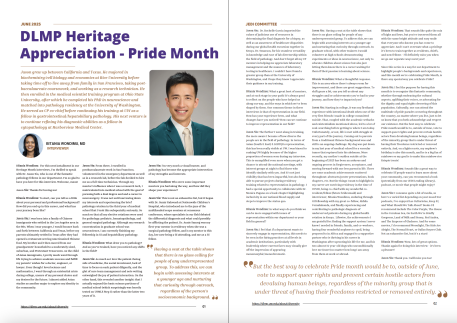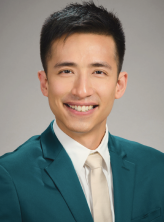DLMP Heritage Appreciation - Pride Month
June 25, 2025

Interview by Bitania Wondimu, MD
Dr. Jason Siu grew up between California and Texas. He majored in biochemistry/cell biology and economics at Rice University before taking time off to live away from family in San Francisco, taking post-baccalaureate coursework, and working as a research technician. He then enrolled in the medical scientist training program at Ohio State University, after which he completed his PhD in neuroscience and matched into pathology residency at the University of Washington. He served as CP co-chief before continuing his training at UW as a fellow in gastrointestinal/hepatobiliary pathology. His next venture is to continue refining his diagnostic abilities as a fellow in cytopathology at Harborview Medical Center.

Bitania Wondimu: For this next installment in our Heritage Month interviews, I’m thrilled to speak with Dr. Jason Siu, who is one of the fantastic pathology fellows in our department. I’m so glad to have you here for this interview. Welcome, Jason!
Jason Siu: Thanks for having me!
Bitania Wondimu: To start, can you tell us a little about your personal and professional background? How did you end up in this career, and what has your journey been like?
Jason Siu: I was born into a family of Chinese immigrants who settled in the Los Angeles area in the 80s. When I was younger, I would bounce back and forth between California and Texas, before my parents ultimately settled in Texas after they had opened a restaurant serving Americanized Chinese food. My brother and I then moved from our grandparents’ household to a moderately sized, suburban, and Protestant Texas town. As the child of Asian immigrants, I pretty much went through life trying to achieve academic success and fulfill my parents’ wishes for a doctor, engineer, or lawyer. Even though I loved science and mathematics, I went through an existential crisis during college, unsure of my personal choice and my desires for the future. I almost added Asian studies as another major to explore my identity in the community.
From there, I enrolled in postbaccalaureate work in San Francisco, volunteered in the emergency department as well as in a research lab, before the lab decided to hire me as a full-time technician. Through my mentor’s influence when I was a research tech, I matriculated into medical school with the goal of pursuing both a dual degree and and a career in neurosurgery. It was not until narrowing down my interests and experiencing the brief pathology rotation in the third year of medical school that I took this subspecialty seriously. So much so that all my elective rotations were used for pathology: pediatric, hematopathology, and general surgical pathology. Although my research concentration in graduate school was neuroscience, I am currently finishing my fellowship in GI and hepatobiliary pathology.
Bitania Wondimu: What drew you to pathology? And as you’ve trained, have you noticed any shifts in the field?
Jason Siu: As much as I love the patient-facing side of medicine, the social investment, lack of time to focus on each patient diligently, and the glut of care team management and note writing outweighed the joy of patient interaction. On the other hand, this revealed another insight: that I actually enjoyed the basic science portions of medical school (which surprisingly was heavily tested on USMLE Step 1) rather than the latter two years of it.
I’m very much a visual learner, and pathology has become the appropriate intersection of my strengths and interests.
Bitania Wondimu: Who were some important mentors you had along the way, and how did they shape your experience?
Jason Siu: This is not an exhaustive list, but it began with Dr. Samir Kahwash at Nationwide Children’s Hospital, who introduced me to the joys of the multiheaded scope sessions at consensus conference, where specialists in our field debated the differential diagnosis and what could possibly be afflicting the patient. Dr. Annie Samraj was my first-year mentor in residency when she was a surgical pathology fellow, and is my mentor to this day, her now being a GI attending, and me as a GI fellow.
Dr. Rochelle Garcia imported the values of judicious use of resources in determining the final diagnosis for a biopsy, as well as an awareness of healthcare disparities during our global health excursion together in Kenya. Dr. Swanson, for his seamless versatility in knowledge and ease of lab directorship within the field of pathology. And don’t forget all my CP mentors in helping me appreciate laboratory management and the nuances of laboratory testing in healthcare. I couldn’t have found a greater group than at the University of Washington, and I hope they know I appreciate their guidance in my training.
❝ Having a seat at the table shows that there is no glass ceiling for people of any underrepresented group. To address this, we can begin with assessing interests at a younger age and nurturing that curiosity through outreach, regardless of the person's socioeconomic background. ❞
Bitania Wondimu: What a great host of mentors, and at each stage in your path! It’s always good to reflect on the people who have helped us along our way, and the ways in which we’ve been shaped by them. One common theme in these interviews is that of representation in our field. How has your experience been, and what changes have you noticed? How can we continue to improve representation in our field?
Jason Siu: The further I went along in training, the more aware I became of how diverse the people are in the field of pathology. In terms of Asian (South & East) & LGBTQIA representation, this has been really visible at UW. I was biased to ranking UW highly because of the higher proportion of women seen during my interview. This is exemplified even more when you get a chance to attend the national meetings, with interest groups at night to find those who identify similarly with you. And it’s not just visibility that has been impactful, but also being able to pursue projects during residency training related to representation in pathology. I had a special opportunity to collaborate with Dr. Monica Pagano on a book chapter highlighting inclusivity in our national blood supply and steps to improve the status quo.
Bitania Wondimu: In what ways do you think we can be more engaged with issues of representation within our department or your field in general?
Jason Siu: I feel that if a department wants to sincerely engage in representation, this needs to be seen in the hiring practices at all levels in academic institutions, particularly with leadership where current faces may visually give off the impression of appearing monomorphic/monochromatic.
Having a seat at the table shows that there is no glass ceiling for people of any underrepresented group. To address this, we can begin with assessing interests at a younger age and nurturing that curiosity through outreach. In graduate school, with other trainees I would volunteer at high schools demonstrating experiments or ideas in neuroscience, not only to educate children about science but also just letting them know there is a career waiting for them if their passion is learning about science.
Bitania Wondimu: What a thoughtful response. This is an area where there’s always room for improvement, and those are great suggestions. To shift gears a bit, can you tell us about any struggles and/or achievements you’ve had in your journey, and how they’ve impacted you?
Jason Siu: Starting in college, it was my firsthand experience with intentional death when one of the very first friends I made in college committed suicide. That, coupled with the academic setbacks and existentialism mentioned above, led to a lot of soul-searching before getting to where I am today. Unfortunately, or not, life is met with struggle at every part of the journey. Coming out to parents from a traditional Chinese background was and still is an ongoing challenge. My dog was put down in my last year of medical school for a vascular tumor that ruptured into his abdomen. More recently, my mother’s sudden suicide at the beginning of 2025 has been an arduous and ongoing process in forgiveness, acceptance, and moving forward with one less parent in life. There are some academic achievements scattered throughout: abstracts/poster presentations, book chapters, etc. But the things I want to highlight in my career are surviving residency in the time of COVID, being co-chief with my wonderful co-resident/fellow (future bridesmaid) and interviewer, Bitania Wondimu, enduring through GI fellowship with my great co-fellow, Akhila Vemulakonda, and finally experiencing and contributing to pathologic diagnosis of underserved patients during my global health rotation in Kenya. Lifewise, the achievements I am grateful for: finding the support system I never knew I needed in friends, family, and co-workers, having four wonderful nephews to spoil, being proposed to in Africa and engaged to a supportive partner who is thriving in his career in Washington after uprooting his life for me, and his two almost 14-year-old dogs who unconditionally love me (more) no matter how long I am away from them at work or abroad.
Bitania Wondimu: That sounds like quite the mix of highs and lows, but you’ve traversed them all with the same bright attitude and easy smile that everyone who knows you has come to appreciate. And I can’t overstate what a privilege it’s been to train together as residents, chiefs, and now fellows - I’ll definitely miss you when we go our separate ways next year!
Since this series is a way for our department to highlight people's backgrounds and experiences, and this month we're celebrating Pride Month, is there any special way you celebrate Pride?
Jason Siu: I feel the purpose for having this month is to recognize this fantastic community, whether through embracing the cultural aspects, uplifting their voices, or advocating for the dignity and equal rights deserving of this population. Culturally, one can attend the multitude of pride parades occurring throughout the country, no matter where you live, just to let us know that you both acknowledge and respect our existence. But the best way to celebrate Pride month would be to, outside of June, vote to support queer rights and prevent certain hostile actors from devaluing human beings, regardless of the minority group that is under threat of having their freedoms restricted or removed entirely. And, on a lighter note, my nephew’s birthday is also this month, and he is a big fan of rainbows so my goal is to make him rainbow rice Krispie treats!
Bitania Wondimu: Sounds like a great way to celebrate! If people want to learn more about your community, can you recommend a book (potentially from our JEDI Lending Library), podcast, or movie that people might enjoy?
Jason Siu: I consume quite a bit of media, so here’s a varied list depending on your mood! For podcasts, I’ve enjoyed Las Culturistas, Keep It!, and What Should We Talk About? Books I’d recommend include The Color Purple, The House in the Cerulean Sea, On Earth We’re Briefly Gorgeous, Land of Milk and Honey, Red Azalea, and The Emperor of Gladness. And for some movies, I’d recommend Moonlight, The Kids Are Alright, The Normal Heart, or Dallas Buyers Club. Not an exhaustive list, but it’s a start!
Bitania Wondimu: Wow, lots of great options. Thanks again for doing this interview - it’s been a pleasure!
Jason Siu: Thank you. I will miss you too!